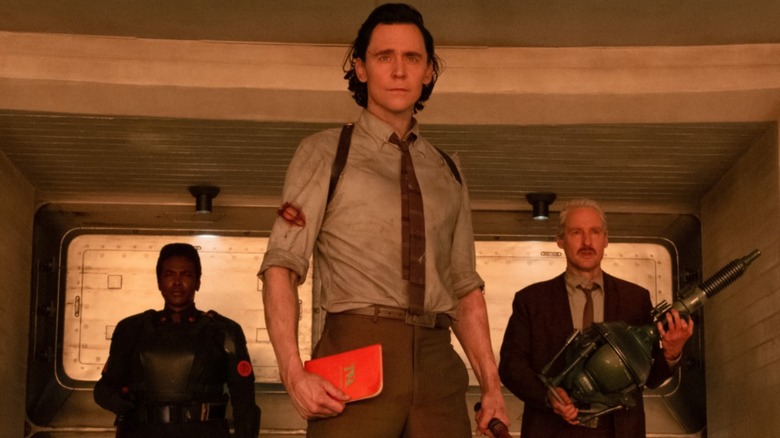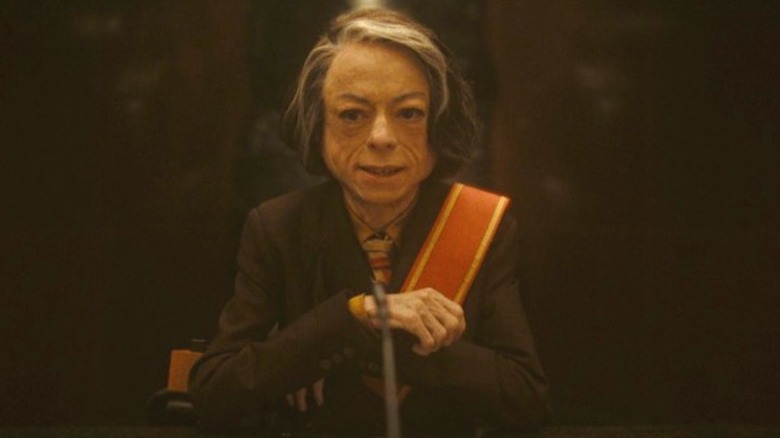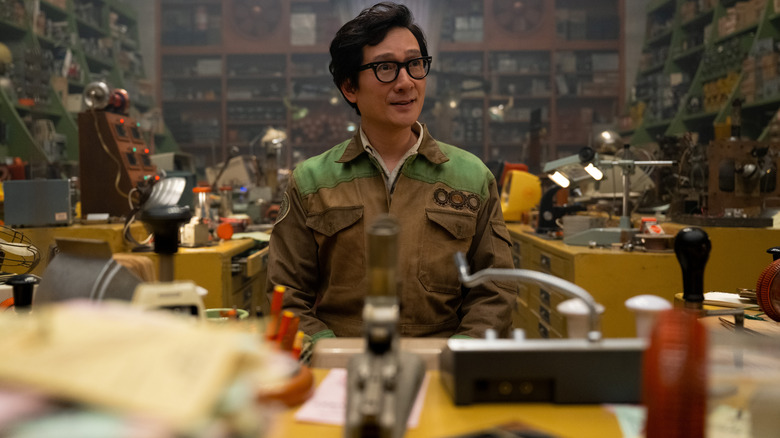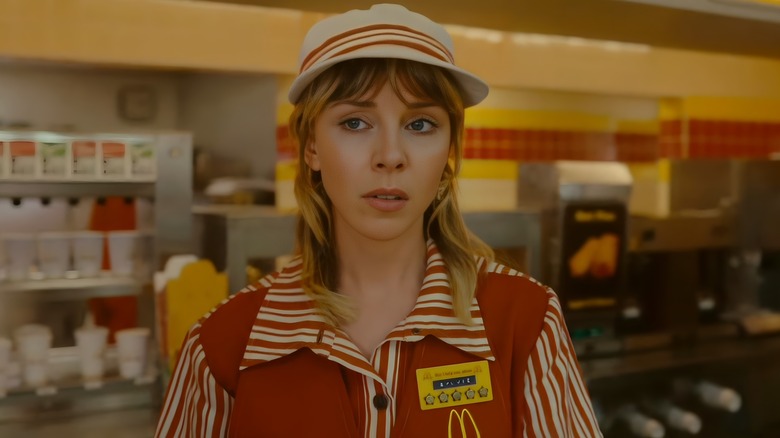3 Lines In Loki Season 2 That Mean More Than You Realized
Contains spoilers for "Loki" Season 2, Episode 1 — "Ouroboros"
The Norse god of mischief is back for another season of the Disney+ Marvel original series "Loki." Following the events of Season 1, Loki (Tom Hiddleston) and Sylvie (Sophia Di Martino) are no longer on speaking terms, He Who Remains (Jonathan Majors) is just decaying remains at the end of time, and the Time Variance Authority now knows that every single one of its agents was "hired" through kidnapping, memory-wiping, and brainwashing. Fun times are being had by all, and with the TVA's current power structure in shambles, it's up to the trickster god and his assortment of allies to prevent both the TVA and time itself from unraveling into permanent oblivion.
Much like the Temporal Loom, "Loki" Season 2 gets convoluted. It's tasked with weaving an incredible amount of information into something digestible, something concrete. And also much like the Temporal Loom, it struggles to handle the increased narrative load. But even in the midst of confusion, the writing staff manages to deliver some memorable lines of dialogue that remind audiences why they keep tuning in. Hint: It's not just for Hiddleston's winning charm, although there's no argument that it's doing some heavy lifting. Here are some of the coolest, heftiest, and most meaningful bits of script from "Loki" Season 2.
'All my life, I've always handed down the same verdict: guilty. The Time-Keepers deemed it so.'
At its core, "Loki" Season 2 questions the reach of authority. Is it right, or even helpful, for the TVA to prune branched timelines — read: commit genocide — all in the name of protecting the Sacred Timeline? Is it right, or even helpful, for someone to do the same to the TVA? And are such decisions not an act of playing god? Hunter B-15, whom Wunmi Mosaku built from scratch, certainly thinks so, pleading with her superiors in a meeting with the Judges' Council to put a pause on pruning.
While her words fall on deaf ears for some, they're a much-needed wake-up call for others. Judge Gamble (Liz Carr) takes the revelation of her origin as a stolen variant hard, realizing that she's condemned other variants to death for falling outside of the same parameters she does. When she says, "All my life, I've always handed down the same verdict: guilty. The Time-Keepers deemed it so," audiences understand that she's broken free from the Matrix.
And it's that clarity that means so much more because Judge Gamble can so easily be swapped out with a number of authority figures in real life. Everyone watching "Loki" Season 2 can conjure up some leader, whether political, religious, or corporate, who could do with a similar reality check. The idea of power realizing its own ramifications is so idyllic that it's almost too fantastical, even for a Marvel project, but only time will tell if Judge Gamble follows through on her new worldview.
'Wow. That makes perfect sense. There's no flaw in that logic.'
After a particularly confusing conversation between Mobius (Owen Wilson) and TVA tech guy Ouroboros (Ke Huy Quan), the latter says what everyone watching is probably thinking: "Wow. That makes perfect sense. There's no flaw in that logic." O.B.'s demeanor is so pure, his tone so genuine, and his smile so friendly that it's almost impossible to criticize him for being an apologetic mouthpiece to a seemingly self-aware production team. Yes, the line is funny because Quan is funny, but it's also funny because it's so obviously a moment of lampshading.
While lampshading can be used to great effect when meta-jokes are on the table, it can also be used to bypass necessary narrative adjustments. With this line coming so early in the season, it feels as though Marvel Studios is plainly informing audiences that critical analysis will not be tolerated. And that's frustrating because, again, it's coming out of Quan's mouth, an objectively talented and funny guy. How dare "Loki" make us feel conflicted emotions about that man! There's got to be a law on the books somewhere that penalizes that kind of thing.
'Not squirrel, not possum, not rats, something that's already dead, and nothing with a face. Please.'
After killing Kang variant He Who Remains, Sylvie lands in a McDonald's in a branched timeline, where the employee behind the counter asks her what she'd like to eat. In response, she says, "Not squirrel, not possum, not rats, something that's already dead, and nothing with a face. Please." The best part is that she delivers this list with practiced ease, as if she's rattled it off a hundred times before in a hundred different places, leaving audiences wondering whether variants of McDonald's serve living rodents and how often she's been offered food with a face still attached.
It's silly, gross writing, the kind that fits perfectly in a superhero TV series, but it's also smart because no one hears Sylvie recite her edible boundaries without immediately knowing that somewhere, somewhen, she's experienced a few of these situations. Of course, that's down to the acting too. Sophia Di Martino appears tired and resigned here, all except for when she remembers to punctuate her request with a "please." And that raises more questions: Why does she make sure to ask politely? What's happened in the past when she doesn't?



